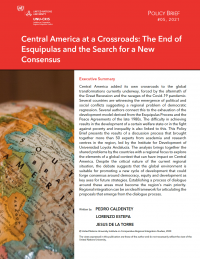Central America at a Crossroads: The End of Esquipulas and the Search for a New Consensus

Central America added its own crossroads to the global transformations currently underway, forced by the aftermath of the Great Recession and the ravages of the Covid-19 pandemic. Several countries are witnessing the emergence of political and social conflicts suggesting a regional problem of democratic regression. Several authors connect this to the exhaustion of the development model derived from the Esquipulas Process and the Peace Agreements of the late 1980s. The difficulty in achieving results in the development of a certain welfare state or in the fight against poverty and inequality is also linked to this. This Policy Brief presents the results of a discussion process that brought together more than 50 experts from academia and research centres in the region, led by the Institute for Development of Universidad Loyola Andalucía. The analysis brings together the shared problems by the countries with a regional focus to explore the elements of a global context that can have impact on Central America. Despite the critical nature of the current regional situation, the debate suggests that the global environment is suitable for promoting a new cycle of development that could forge consensus around democracy, equity and development as key axes for future strategies. Establishing a process of dialogue around these areas must become the region's main priority. Regional integration can be an ideal framework for articulating the proposals that emerge from the dialogue process.
